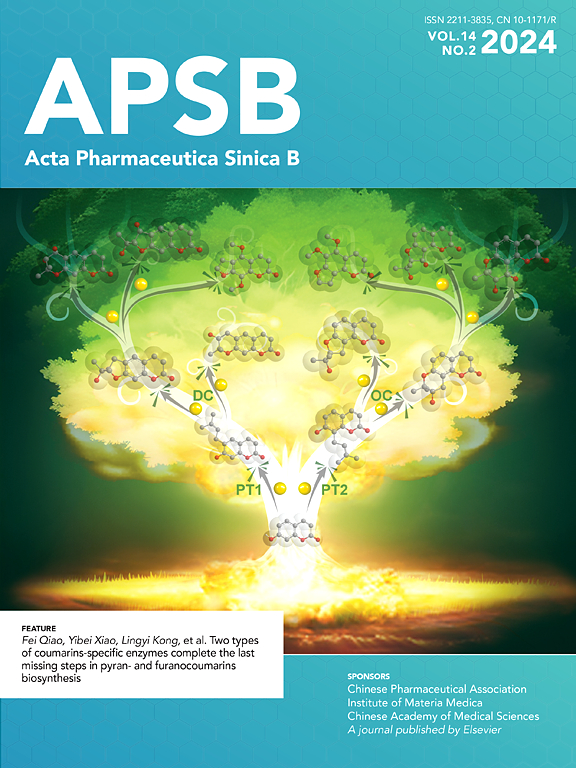Intestinal epithelial cell NCoR deficiency ameliorates obesity and metabolic syndrome
IF 14.6
1区 医学
Q1 PHARMACOLOGY & PHARMACY
引用次数: 0
Abstract
Nuclear receptor corepressor (NCoR1) interacts with various nuclear receptors and regulates the anabolism and catabolism of lipids. An imbalance in lipid/energy homeostasis is also an important factor in obesity and metabolic syndrome development. In this study, we found that the deletion of NCoR1 in intestinal epithelial cells (IECs) mainly activated the nuclear receptor PPARα and attenuated metabolic syndrome by stimulating thermogenesis. The increase in brown adipose tissue thermogenesis was mediated by gut-derived tricarboxylic acid cycle intermediate succinate, whose production was significantly enhanced by PPARα activation in the fed state. Additionally, NCoR1 deletion derepressed intestinal LXR, increased cholesterol excretion, and impaired duodenal lipid absorption by decreasing bile acid hydrophobicity, thereby reversing the possible negative effects of intestinal PPARα activation. Therefore, the simultaneous regulatory effect of intestinal NCoR1 on both lipid intake and energy expenditure strongly suggests that it is a promising target for developing metabolic syndrome treatment.

肠上皮细胞NCoR缺乏可改善肥胖和代谢综合征。
核受体协同抑制因子(NCoR1)与多种核受体相互作用,调节脂质的合成代谢和分解代谢。脂质/能量平衡失衡也是肥胖和代谢综合征发展的重要因素。在本研究中,我们发现肠上皮细胞(IECs)中NCoR1的缺失主要激活核受体PPARα,并通过刺激产热来减轻代谢综合征。肠道来源的三羧酸循环中间体琥珀酸盐介导了棕色脂肪组织产热的增加,在饲喂状态下PPARα的激活显著增加了琥珀酸的产热。此外,NCoR1缺失降低了肠道LXR,增加了胆固醇排泄,并通过降低胆汁酸疏水性损害了十二指肠脂质吸收,从而逆转了肠道PPARα激活可能产生的负面影响。因此,肠道NCoR1对脂质摄入和能量消耗的同时调节作用强烈表明,它是开发代谢综合征治疗的一个有希望的靶点。
本文章由计算机程序翻译,如有差异,请以英文原文为准。
求助全文
约1分钟内获得全文
求助全文
来源期刊

Acta Pharmaceutica Sinica. B
Pharmacology, Toxicology and Pharmaceutics-General Pharmacology, Toxicology and Pharmaceutics
CiteScore
22.40
自引率
5.50%
发文量
1051
审稿时长
19 weeks
期刊介绍:
The Journal of the Institute of Materia Medica, Chinese Academy of Medical Sciences, and the Chinese Pharmaceutical Association oversees the peer review process for Acta Pharmaceutica Sinica. B (APSB).
Published monthly in English, APSB is dedicated to disseminating significant original research articles, rapid communications, and high-quality reviews that highlight recent advances across various pharmaceutical sciences domains. These encompass pharmacology, pharmaceutics, medicinal chemistry, natural products, pharmacognosy, pharmaceutical analysis, and pharmacokinetics.
A part of the Acta Pharmaceutica Sinica series, established in 1953 and indexed in prominent databases like Chemical Abstracts, Index Medicus, SciFinder Scholar, Biological Abstracts, International Pharmaceutical Abstracts, Cambridge Scientific Abstracts, and Current Bibliography on Science and Technology, APSB is sponsored by the Institute of Materia Medica, Chinese Academy of Medical Sciences, and the Chinese Pharmaceutical Association. Its production and hosting are facilitated by Elsevier B.V. This collaborative effort ensures APSB's commitment to delivering valuable contributions to the pharmaceutical sciences community.
 求助内容:
求助内容: 应助结果提醒方式:
应助结果提醒方式:


